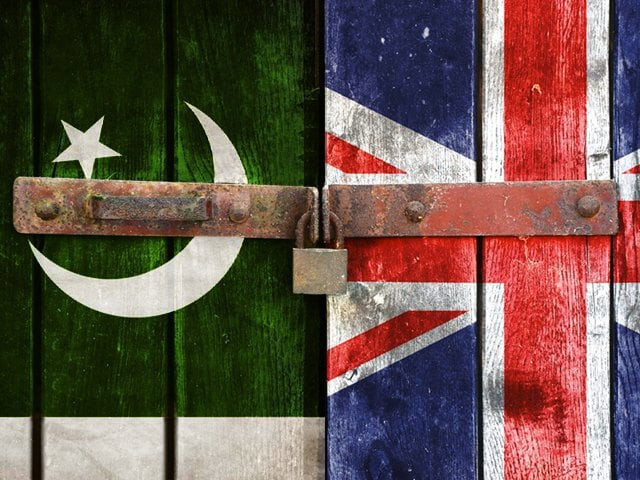For Pakistan, there is good and bad news post-Brexit
Though neutral for now, the recent geo-political change holds both positive and negative implications for Pakistan

Though neutral for now, the recent geo-political change holds both positive and negative implications for Pakistan. CREATIVE: NABEEL AHMAD
On the eve of the Brexit vote, ten winners of the Nobel Prize in Economics wrote a letter to The Guardian. They warned that a vote to leave the European Union could hurt the UK in three ways: firstly, it would limit UK’s access to the European market; secondly, it would force the UK to redefine trade relationships within and outside Europe; and thirdly, separation would be slow, leading to years of uncertainty for investors.
Britain voted to leave anyway, and global equities lost over $2 trillion in a day.
Post-Brexit: What it means for the Pakistani economy
The social and political repercussions are relatively straightforward.
The EU has lost some of its political clout on the global stage, while isolationist parties in the member states have gained ground. Another major exit could trigger an unravelling. If Scotland seeks a referendum for independence, the UK will lose clout as well.
This political vacuum should provide the US, China, Russia, and India opportunities to extend their influence. China, as the most pragmatic of these players, may gain the most.
However, economic repercussions are actually unclear. There are always costs and benefits to economic arrangements. In the case of the EU, the main question is whether the benefits of market access and bargaining power for member states exceed the costs of lobbying, regulatory compliance, bloated bureaucracy, and rent-seeking.
There has been some suggestion that the UK could have its cake and eat it too, a la Norway. This would allow the UK to maintain market access while freeing its industries from some EU regulations.
I think this unlikely. It would be political suicide for the Union. A Norway style arrangement would signal to other EU members that opting out is relatively painless, and countries may start queuing for the exit. It is difficult for the EU to afford such a precedent.
So the post-Brexit negotiations are likely to trigger a long period of uncertainty and risk aversion. These lengthy negotiations are the likeliest source of economic loss.
KSE-100 index falls 2% in early trade on Brexit volatility
What’s in it for Pakistan?
Meanwhile, what are the implications for Pakistan? Again, the picture is complicated, so the following comes with a liberal serving of salt.
Things look neutral for now. Even a broken clock is true twice a day, and our particular brokenness-insularity and low exports - makes us a potential refuge in the post-Brexit world.
Let’s start with the bad news.
First, exports should decline, for two reasons. First, the UK is the third largest importer of Pakistani goods, behind the United States and China. Pakistan’s exports were helped by the GSP Plus arrangement with the EU, but Britain’s exit means that we will have to renegotiate terms with our largest European importer. Second, the weakening of both the pound sterling and the euro will make Pakistani exports more expensive for European consumers.
Second, remittances may decline. The UK is the third largest source of remittances for Pakistan, behind Saudi Arabia and the UAE. Remittances come from the savings of Pakistanis and Pakistan-origin foreigners. These savings are expected to shrink in the UK.
With access to the EU market in peril, Brexit may lower foreign direct investment, increase unemployment, and increase prices in the UK. An added concern is the anti-immigrant sentiment, which may prompt some Pakistanis to leave the UK — this could trigger a one-off increase in foreign reserves as some workers return with their savings.
Third, foreign portfolio investment should decline. The only foreign portfolio investors in Pakistan are institutional investors who are very particular about their exposures to risk. Virtually all such investors are exposed to the UK or EU markets. As the risk from these portfolios increases, investors are likely to reduce their exposure to emerging markets such as Pakistan.
And now the good news
First, foreign direct investment may rise. Here our insularity can provide some refuge for skittish foreign capital. The UK has the third largest direct investment inflows into Pakistan, behind China and the UAE. Several multinationals based in these countries are well-established here.

Stalwarts like Unilever, GlaxoSmithKline, Nestle, and Colgate-Palmolive have been early shelters for investors, and their steady profitability in Pakistan could encourage new inflows.
These hilarious tweets are the only funny thing about #Brexit
Second, external debt servicing and repayment may become easier.
This is one area where our insularity may help us. Exports are a small portion of Pakistan’s GDP, and the rupee is not highly correlated with the dollar, euro, or yen (the main denominations of our external debt). By the end of March 2016, our external debt and liabilities stood at $69.6 billion. The lion’s share was external public debt, at $55.1 billion. Much of this debt will mature over the next few years.
If a protracted Brexit process can push exchange rates down enough for long enough, we may have an easier time repaying our debts.
Third, the confluence of Russia’s Eurasia Economic Union and China’s ‘One Belt, One Road’ projects will likely gain momentum as the EU reorganises.
CPEC makes Pakistan a natural ally in these projects. If we can provide security and sensible foreign policy in these uncertain times, we may accelerate the development of the Economic Corridor over the next few years.
The writer is a professor of law and adjunct professor of business at the Lahore University of Management Sciences.
Published in The Express Tribune, June 27th, 2016.
Like Business on Facebook, follow @TribuneBiz on Twitter to stay informed and join in the conversation.


















COMMENTS
Comments are moderated and generally will be posted if they are on-topic and not abusive.
For more information, please see our Comments FAQ